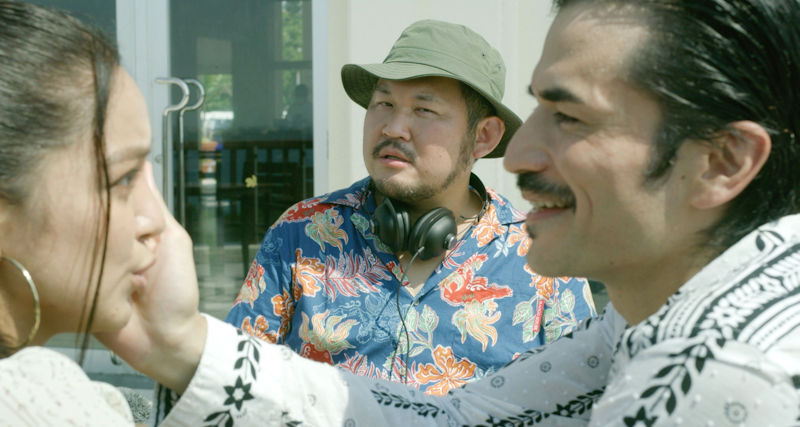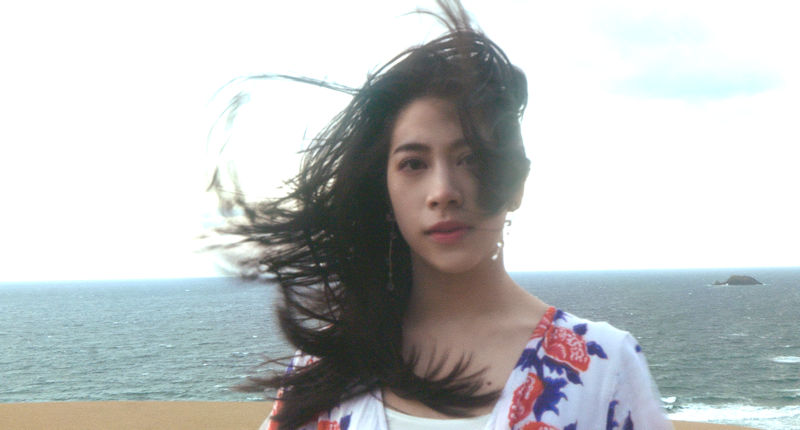
Written by Richard Durrance on 12 Aug 2024
Distributor Third Window • Certificate 12 • Price £15.99
Insert your usual Richard is trepidatious for some reason introduction to Your Lovely Smile. I jest but comedy does not always travel well and Your Lovely Smile is pitched as a comedy, so yeah, I wasn’t quite sure how well this would travel and knowing that most of my favourite comedies are those with bite and, often, elegance, I love the Ealing comedy Kind Hearts of Coronets for a reason. It’s vicious, subversive of class and very elegant. Yet the recent Sogo Ishii release, The Crazy Family, was also brilliant and brilliantly manic. Manic is not normally my thing, I tire of manic within minutes, it saps me like 100% humidity, but The Crazy Family is proof that it’s how you do things that matters, even if perhaps the exception that proves the Richard rule.
Your Lovely Smile is not The Crazy Family nor is it Kind Hearts of Coronets. Your Lovely Smile is its own nuanced beast.
Indie director Hirobumi Watanabe is struggling to find work and inspiration; finally given an assignment in Okinawa he finds himself writing a film for a preening, dim-witted yakuza (Shogen) and his wannabe actress airhead girlfriend. Sacked from the job, Watanabe starts to travel the length of Japan, visiting mini-theatres to try and sell his films.
Some may remember recently JFF+ streamed a number of Japanese films, all of which were recommended by mini-theatres, essentially small independent cinemas, so it's interesting that Your Lovely Smile was going to enter this milieu. The film strikes an intriguing balance, starting off in Watanabe’s hometown, officially the most boring city in Japan (so we’re told), a place with little to do and where he struggles to either make money or find inspiration; we meet Watanabe reading books on Kaneto Shindo and Shohei Imamura, as he seeks to find a way past his writer's block. As he is then given what sounds a legit job in Okinawa, the moment you see the yakuza you know nothing here is quite right, and definitely not for our sensitive, artistically inclined protagonist. What? Writing a script by morning is not possible? The Yakuza is interested only in himself and thinks Watanabe wants to tell his story, not that there seems to be much story beyond bullshit braggadocio.
Some might find this opening a bit out of sync with the rest of the film, but I think it’s necessary, it helps set up Watanabe’s character, this openness and quiet humanity, just as the film opens he also shows defiance (he wears a t-shirt openly declaring “Fuck off” and loudly plays his electric guitar to piss off his neighbours who are themselves playing loud karaoke - and for my money karaoke in anything other than a locked room is a sin, so I know who my sympathy is with). It also symbolises the problem Watanabe is perhaps faced with. Often people, as the film progresses, ask him what kind of films he makes and he struggles to answer, calling them odd, but perhaps because some films are hard to define, like watching a Guy Maddin film, you have to watch one to know what a Guy Maddin film feels like. You cannot accurately put it into words (though fair enough I’d give a go). Watanabe’s problem is his films are not obviously commercial and he’s faced with a yakuza who becomes symbolic of the kind of producer who is only in it for prestige, or money, or to try and impress their girlfriend (though he’s happy to ditch her to go off with all manner of women when he wants to). There's a lovely strand of menacing humour to these scenes as well.
Then the film settles into a different cadence, one that could easily have become very dull very quickly. Watanabe starts to visit the mini-theaters still fighting the good fight to show unusual and interesting films, often in small towns, that make little money and do it for love. One reason I think the film shucks off potential tiresomeness is because this is not a film about the destination but about the journey. It is also willing to delve into the everyday, into places not normally shown in onscreen, and we often get small insights into these average towns, and this minutiae is intriguing, like using small hot springs to boil eggs for breakfast. I love views into life that we rarely see.

Yakuza and girlfriend, and barely a braincell between them
As Watanabe walks to the various mini-theatre owners, tries to sell his wares, often telling half-truths but never with malice, it starts to paint a picture both of post-COVID Japan and its impact not just on the artform but on the journey of the artist who is not subsidised and must trudge for their art. When finally he is given a three-film run, he has to walk the streets, hand out leaflets, try and sell tickets and even then almost no one comes, but then the cinema owner expects nothing less, they are used to small audiences, but often appreciative ones. This is not failure even if perhaps it is not success. Success if anything is relative. There are moments of great pathos but the emotions are almost always kept in check, the most moving though being a moment where he is paying to be washed by a young woman; they are sat in the bath and it could be a horribly sordid moment when he asks if he can hold her but it is remarkably touching, because it’s about making a connection to a person and these are two people who are not doing what they might want, one wants to be making films not on the tramp trying to sell them, the young woman you think is not there by choice but by financial necessity, sitting naked in a bath cleaning a complete stranger.
The scene wrongfoots you and the film does a little too, the start maybe making you think it's one thing then it morphs into another, and it is one that works its way under your skin without you knowing it’s done it. Watanabe’s quiet humanity and commitment, as well as his love of film and the mini-theatres he visits as spaces appear to have an almost religious intensity to both Watanabe and the communities that use them - it's subtly moving. It works too because it never tries to manipulate, it trusts that we viewers will have the emotional intelligence to empathise to what unfurls slowly before us.
That said this is quite a meta film on one level, in how our protagonist plays himself though is in part still a fictional being (Watanabe is himself a filmmaker; and the moments we see of his films, the talk of his production company with his brother, are real). We learn the film is born of a documentary, as we see in the end credits, but what’s important here is none of this matters in and of itself. The reality of what we see is equally true if watched as pure fiction just as much as it is knowing that Watanabe is a well thought of but struggling director. Just as those we meet running mini-theatres really are running the mini-theatres they own. These are real people living real lives in a pseudo-fiction. But it’s never smart-arse and the filming of it by director Kah-Wai Lim has a documentary style to it, often allowing the camera to linger on what we see, allowing us to be witnesses.
That said the film does have subjective aspects that intersperse it and are perhaps glimpses into Watanabe’s mind. Also within it is the woman (Hikaru Hirayama), a woman who keeps appearing in different guises, a dancer (and a dancer she really is), the owner of an antique shop, and this too blurs the borders between fiction and reality.
I am not sure I agree that that Your Lovely Smile is a comedy, nor a comedy drama. To be fair I don’t think there’s any reason to put it into any pigeonhole. True, the moments with the yakuza fall more firmly under the comedy banner, but the film is too warmly humane in following Watanabe to be funny in the way that many people may associate with a comedy. There’s a quiet lightness that underpins everything that you could mistake for comedy, where it is really something else indeed.
Honestly, if wanting to define the film you'd say it one is that is described by its love of cinema, providing an insight into its different forms, and a view into the difficulty of aiming to be a creative force on your own terms. Rarely can anyone do it, I mentioned Maddin, he’s one, Shinya Tsukamoto is another but there are few who can say the same, few who may be given the chance to be so. Your Lovely Smile is a film that may not immediately jump off the shelf at people, but once you let it humane flow wash around you I think many will be as pleasantly surprised by it, just as I was.


Long-time anime dilettante and general lover of cinema. Obsessive re-watcher of 'stuff'. Has issues with dubs. Will go off on tangents about other things that no one else cares about but is sadly passionate about. (Also, parentheses come as standard.) Looks curiously like Jo Shishido, hamster cheeks and all.
posted by Richard Durrance on 17 Dec 2025
posted by Richard Durrance on 12 Dec 2025
posted by Ross Locksley on 09 Dec 2025
posted by Richard Durrance on 28 Nov 2025
posted by Richard Durrance on 25 Nov 2025
posted by Richard Durrance on 18 Nov 2025
posted by Richard Durrance on 14 Nov 2025
posted by Richard Durrance on 11 Nov 2025